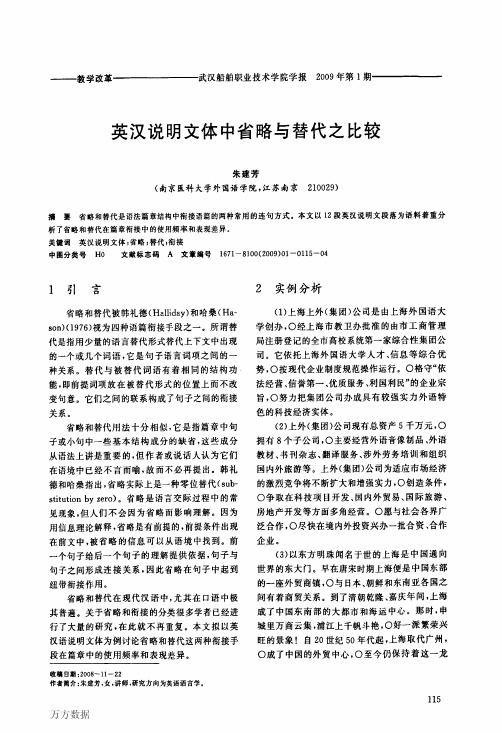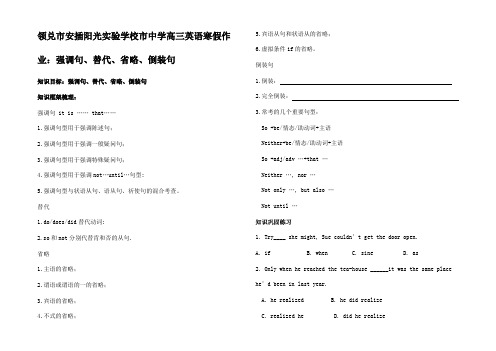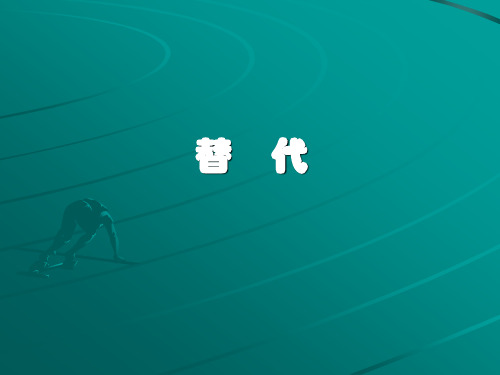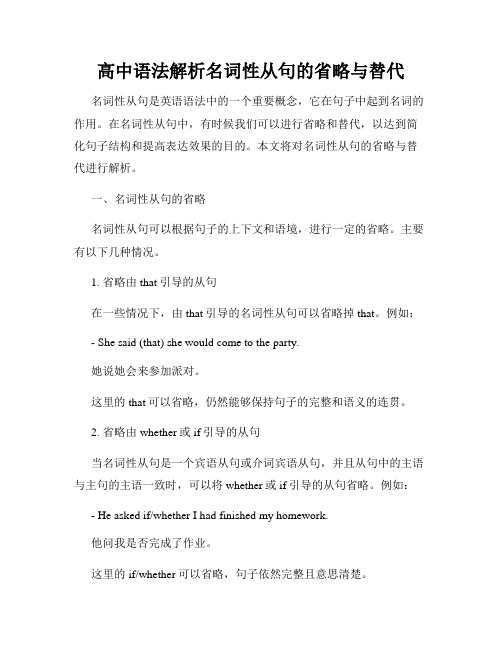省略与代替
英汉说明文体中省略与替代之比较

ranks among the world’S most populous cit—
one
tongue
in
cheek.They
ies,London is still
of the world’S major fi—
themselves and their country,and they
nancial and cultural capitals. (11)London itself is
文献标志码A文章编号 1671—8100(2009)01--0115--04
引
言
2
实例分析
(1)上海上外(集团)公司是由上海外国语大
省略和替代被韩礼德(Halliday)和哈桑(Ha- son)(1976)视为四种语篇衔接手段之一。所谓替 代是指用少量的语言替代形式替代上下文中出现 的一个或几个词语,它是句子语言词项之间的一 种关系。替代与被替代词语有着相同的结构功 能,即前提词项放在被替代形式的位置上而不改 变句意。它们之间的联系构成了句子之间的衔接 关系。 省略和替代用法十分相似,它是指篇章中旬 子或小句中一些基本结构成分的缺省,这些成分 从语法上讲是重要的,但作者或说话人认为它们 在语境中已经不言而喻,故而不必再提出。韩礼 德和哈桑指出,省略实际上是一种零位替代(sub-
a
be very self-critical,while remaining always
a
living museum,with
intensely patriotic.They have of everyday things,and
wide knowledge keen interest in
more than 2000 years of history and culture.But it also boasts
高三英语 寒假作业 强调句替代略倒装句

领兑市安插阳光实验学校市中学高三英语寒假作业:强调句、替代、省略、倒装句知识目标:强调句、替代、省略、倒装句知识框架梳理:强调句 it is …… that……1.强调句型用于强调陈述句;2.强调句型用于强调一般疑问句;3.强调句型用于强调特殊疑问句;4.强调句型用于强调not…until…句型;5.强调句型与状语从句、语从句、祈使句的混合考查。
替代1.do/does/did替代动词;2.so和not分别代替肯和否的从句.省略1.主语的省略;2.谓语或谓语的一的省略;3.宾语的省略;4.不式的省略;5.宾语从句和状语从的省略;6.虚拟条件if的省略。
倒装句1.倒装:2.完全倒装:3.常考的几个重要句型:So +be/情态/助动词+主语Neither+be/情态/助动词+主语So +adj/adv …+that …Neither …, nor …Not only …, but also …Not until …1. Try____ she might, Sue couldn’t get the door open.A. ifB. whenC. sineD. as2. Only when he reached the tea-house ______it was the same place he’d been in last year.A. he realizedB. he did realizeC. realized heD. did he realize3. —It’s nice. Never before____ such a spe cial drink! —I’m glad you like it.A.I have hadB. I hadC. have I hadD. had I4. Was it on a lonely island ______ he was saved one month after the boat went down?A. whereB. thatC. whichD. what5.It is not how much we do but how much love we put into what wedo_____benefits our work most. A. who B. which C. that D. what 6. —Have you seem the film Under the Hawthorn Tree?— Of course, I have. It was in our village _______ it was made.A. thatB. whereC. whenD. which7. It’s not what we do once in a while ______ shapes our lives, but what we do consistentlyA .which B. that C. how D. when 8. Jane won’t join us for dinner tonight and .A. neither won’t TomB. Tom won’t eitherC. Tom will tooD. so will Tom9.It sounds like something is wrong with the car’s engine._______, we’d better take it to the garage immediately.A. OtherwiseB. If notC. But for thatD. If so10._____ a strange plant! I've never seen it before. A. Which B. What C. How D. Whether 11.It doesn’t matter if they want to come to your party, _______?A. doesn’t itB. does itC. don’t theyD. do they12. I have seldom seen my mother _______ pleased with my progress as she is now .A. soB. veryC. tooD. rather13. It was from only a few supplies that she had bought in the village _______ the hostess cooked such a nice dinner. A. whereB. thatC. whenD.which14.—Who should be responsible for the accident?—The boss, not the workers. They just carried out the order .A. as toldB. as are toldC. as tellingD. as they told15. John’s success has nothing to do with good luck. It is yearsof hard work has made him what he is today.A. whyB. whenC. whichD. that16. Little about her own safety, though she was in great danger herself.A. did Rose careB. Rose did careC. Rose does careD. does Rose care17. —Is everyone here?—Not yet……Look , there_______ the rest of our guests!A. comeB. comesC. is comingD. are coming18. If you have a job, yourself to it and finally you’ll succeed.A. do devoteB. don’t devoteC. devotingD. not devoting19. We laugh at jokes, but seldom about how they work.A. we thinkB. think weC. we do thinkD. dowe think20 John opened the door . There _____ he had never seen before.A. a girl did standB. a girl stoodC. did a girl standD. stood a girl21.—I wonder ________ you’ll water t his kind of flower.—Every other day.A. how oftenB. how longC. how soonD. how much22. Not until he left his home ______ to know how important the family was for him.A had he begunB did he beginC he beganD he had begun23. At the meeting place of the Yangtze River and the JialingRiver______, one of the ten largest cities in China.A. lies ChongqingB. Chongqing liesC. does lie ChongqingD. does Chongqing lie24. a certain doubt among the people as to the practical value of the project.A. It hasB. They haveC. It remainsD. There remains25. For a moment nothing happened. Then all shouting together.A. voices had comeB. came voicesC. voices would comeD. did voices come26. Every evening after dinner, if not from work, I willspend some time walking my dog. A. being tired B.tiring C. tired D. to be tired27. You and I could hardly work together, ?A. could youB. couldn’t IC. couldn’t weD. could we28. According to statistics, a man is more than twice as likely to die of skin cancer _________ a woman.A. thanB. suchC. soD. as29. The computer was used in teaching. As a result, not only________, but students became more interested in the lessons.A. saved was teachers’ energyB. was teachers’ energy savedC. teachers’ energy was savedD. was saved teachers’ energy30. So sudden ________that the enemy had no time to escape.A. did the attackB. the attack didC. was the attackD. the attack was第一节:完形填空You are travelling on an ocean ship when, suddenly a giant wave causes the ship to overturn. Hundreds of people die 21 , but you and several others 22 in the ballroom. Would you stay there and 23 for help? Or would you try, 24 the danger, to find your way out of the ship?This is the 25 faced by the characters in the film “Poseidon”.Trapped in the ballroom of the overturned ship, the 26 orders the surviving guests to wait for help. A small group of people 27 to accept this fate. They try to escape, knowing that there will be no way back 28 the captain locks the doors behind them.At the time of the disaster, each of the characters is trying to overcome personal problems in their own lives. All must face their 29 and make life and death decisions.Architect Richard Nelson is preparing to kill himself when the wave hits. He feels depressed over the 30 of his relationship with his partner. But he is forced to fight 31 his life, and learns to want to live again. He realizes he must 32 the past and not think too much about the bad.Robert Ramsey, a fireman, decides to 33 his own life so that his daughter, Jen, 34 live. He swims t o the ship’s control room 35 he must press a switch to change the direction of the ship.He knows he will likely 36 in the process, but just as surely, he knows that it’s the only way his fri ends can escape. His actions give the others a chance to reach 37 . They escape from the ship just before it 38 , killing all those waiting inside and Jen’s father as well. All the characters who survive feel 39 to be alive, but they are also aware that their own 40 , bravery and determination saved their own lives.21. A. gradually B. immediately C. finally D. individually22. A. stay B. dance C. survive D. live23. A. ask B. cry C. wait D. demand24. A. despite B. in C. with D. except25. A. position B. dilemma C. danger D. scene26. A. director B. passenger C. sailor D. captain27. A. refuse B. agree C. hesitate D. dislike28. A. unless B. until C. once D. when29. A. death B. survival C. courage D. fears30. A. end B. departure C. failure D. difficulty31. A. against B. for C. with D. over32. A. let alone B. let out C. let go of D. let down33. A. give out B. give away C. give in D. give up34. A. might B. can C. would D. must35. A. which B. there C. where D. then36. A. succeed B. fail C. survive D. drown37. A. home B. safety C. success D. destination38. A. breaks B. explodes C. sinks D. overturns39. A. relieved B. lucky C. relaxed D. happy40. A. choices B. calmness C. fortune D. confidence第二节:阅读理解AThe booking notes of the play “the Age of Innocence”:Price: $10BOOKINGThere are four easy ways to book seats for performance:------ in personThe Box Office is open Monday to Saturday, 10 a. m. -8 p. m.------ by telephoneRing 01324976 to reserve your tickets or to pay by credit card (Visa, MasterCard and Amex accepted)------ by postSimply complete the booking form and return it to Global Theatre Box Office.------ on lineComplete the on-line booking form at www. Satanfiedtheatre. comDISCOUNTS:Saver: $2 off any seat booked any time in advance for performances from Monday to Thursday. Savers are available for children up to 16 years old, over 60s and full-time students.Supersaver: half-price seats are available for people with disabilities and one companion. It is advisable to book in advance. There is a maximum of eight wheelchair spaces available and one wheelchair space will be held until an hour before the show.Standby: best available seats are on sale for $6 from one hour before the performance for people eligible(suitable)for Saver and Supersaver discounts and thirty minutes before for all other customers.Group Bookings: there is a ten percent discount for parties of twelve or more.School: school parties of ten or more can book $6 standbytickets in advance and will get every tenth ticket free.Please note: we are unable to exchange tickets or refund money unless a performance is cancelled due to unforeseen circumstances.41. If you want to book a ticket, you CANNOT ________.A. use the Internet.B. ring the booking number and pay for the tickets by credit card.C. go to the Box Office on Sundays.D. complete a booking form and post it to the Box Office.42. According to the notes, who can get $2 off?A. A 20-year-old full-time college student.B. A 55-year-old woman.C. An 18-year-old teenager.D. The people who book the tickets on Fridays.43. If you make a group booking for a group of 14 adults, how much should you pay?A. $120B. $126C. $140D. $15044. From the passage we can know all the following information except that ________.A. There are only 8 wheelchair spaces in the theatre.B. The audience can’t refund money if the performance is on show.C. A group of 12 persons can get 10 percent discount.D. A school party of 15 students should pay $90 for the standby tickets.45. What kind of tickets are the cheapest?A. The standby tickets.B. The standby tickets for school parties of ten or more.C. The tickets for Saver discount.D. The tickets for group booking.BFrom the health point of view we are living in an amazing age. We are free from many of the most dangerous diseases. A large number of once deadly illnesses can now be cured by modern medicine. It is almost certain that one day medicines will be f ound for the most stubborn remaining diseases. The expectation of life has increased greatly. But though the possibility of living a long and happy life is greater than ever before, every day we witness the unbelievable killing of men, women and children on the roads. Manvs the motor-car. It is a never-ending battle which man is losing. Thousands of people the world over are killed or horribly killed each year and we are quietly sitting back and letting it happen.It has been rightly said that when a man is sitting behind a steering wheel (方向盘), his car becomes the extension of his personality. There is no doubt that the motor-car often brings out a man’s very worst qual ities.People who are normally quiet and pleasant may become unrecognizable when they are behind a steering-wheel. They say, they are ill-mannered and aggressive, willful as two-year-olds and completely selfish.All their hidden angers and disappointments seem to be brought to the surface by the act of driving.The surprising thing is that society smiles so gently on the motorist and seems to forgive his behavior. Everything is done for his convenience. Cities are allowed to become almost uninhabitable because of heavy traffic; towns are made ugly by huge car parks; the countryside is ruined by road networks; and the deaths become nothing more than a number every year, to be easily forgotten.It is high time a world rule was created to reduce this senseless waste of human life. With regard to driving, the laws of some countries are unbelievably lax (不严格) and even the strictest are not strict enough. A rule which was universally accepted could only have an obviously beneficial effect on the accident rate.Here are a few examples of some of the things that might be done. The driving test should be standardized and made far more difficult than it is; all the drivers should be made to take a test every three years or so; the age at which young people are allowed to drive any vehicle should be raised to at least 21; all vehicles should be put through strict tests for safety each year. Even the smallest amount of alcohol in the blood can damage a person's driving ability. Present drinking and driving laws (where they exist) should be made much stricter. Speed limits should be required on all roads. Governments should lay down safety specifications for car factories, as has been done in the USA. All advertising stressing power and performance should be banned. These measures may not sound good enough. But surely nothing should be considered as too severe if it results in reducing the number of deaths. After all, the world is for human beings, not motor-cars.46. What is the main idea of this passage?A. Traffic accidents are mainly caused by motorists.B. Thousands of people the world over are killed each year.C. Only stricter traffic laws can prevent accidents.D. The laws of some countries about driving are too lax.47. What does the author think of society toward motorists?A. Society laughs at the motorists.B. Society forgives their rude driving.C. Victims of accidents are nothing.D. Huge car parks are built in the cities and towns.48. What does the author mean by saying “his car bec omes theextension of his personality” in Para. 2 ?A. Driving can represent his manners.B. Driving can show the other part of his personality.C. Driving can bring out his character.D. Driving can show his hidden qualities.49. Which of the followings is NOT mentioned as a way against traffic accidents?A. Test drivers every three years.B. Stricter driving tests.C. Build more highways.D. Raise age limit and lay down safety specifications.50. The author’s attitude towards the present traffic situation is ________.A. unsatisfiedB. positiveC. appealingD. unclear。
英语中的省略和替代

(3) Should there be a flood, what should we do?
(If there should be a flood)
整理课件
17
5. 英语中有一些固定的省略结构: 在以if, when, though, as if (好象)等连词引导 的从句中, 如从句中的主要动词是be, 常将主语 it 和动词be 省略。 If it is necessary, we shall send a telegram home. 如有必要, 我们就往家里打电报。 Whenever it is possible, he will come to my help. 他一有可能就来帮助我。
1) 并列的不定式可省去后面的 to.
I told him to sit down and wait for a moment. 2) help 当“帮助”讲时, 后面的宾语或宾补的
不定式符号to可带可不带。
I will help (to) do it for you.
I will help you (to) do it. (3) 介词but前若有动词do, 后面的不定式不带
整理课件
4
简单句中的省略
1. 省略主语: 祈使句中的主语通常被省略; 其他省略的主语的情况多限于少数现成的说法。
(1) (You) Come in, please.
(2) ( I ) See you tomorrow.
(3) ( I ) Thank you for your help.
(4) ( I ) Beg your pardon.
英语语法总结:代替与省略

英语语法总结:代替与省略英语中,为了避免不必要的重复,经常用so, not, to, do, does 代替前面出现的动词或相关内容。
(1) 从上两例中看出,do / does / did 代替动词。
He translated the article better than I did. (did代替wrote it)—Do you think she is clever?—I think so. (so代替she is clever)(2) "so 与not" 代替某个词、短语、句子等,通常用于hope, think, believe, expect, suppose, be afraid, fear, imagine, etc后作宾语。
—Is it correct?—I'm afraid not. (not correct)(3) "to" 用作不定式,常跟随下列动词:want, mean, hope, expect, refuse, seem, intend, be, afraid, etc.I asked him to go to the party, but he refused to. (go to the party)(4) "do so, do that, do it" 用来代替动态动词,而不能代静态动词。
—He gave up studying English.—Why did he do so? (= give up studying English) —The dish tastes nice.—Yes, so it does. (tastes nice)(此句不能用it does it 或it does so, 因taste属静态动词。
)(5) 为使语言精炼,避免不必要的重复,对话中常用省略形式。
—He is thinking of buying a car?—Is he? (这里,“thinking of buying a car”被省略了。
英语语法:替代

带后置修饰语的替代词one/ ones也常见于比 带后置修饰语的替代词one/ ones也常见于比 较分句中。例如: 较分句中。例如: Our new cassette is more expensive than the one we had before. before. I like this picture better than the one you showed me yesterday. 替代词one/ ones 在形容词比较级 在形容词比较级、 替代词 one/ ones在形容词比较级 、 最高级以 及某些限定词如this, which, 及某些限定词如this, which,序数词等之后可以 省略。例如: 省略。例如: I want the fifth volume, not the fourth (one). (one). If I miss the 9:15 train, I’ll catch the next (one). (one). The second chapter is much longer than the first (one). (one).
1)替代词one/ ones只能替代单数/复数可数名 替代词one/ ones只能替代单数 只能替代单数/ 词。例如: 例如: There are good films as well as bad ones. (ones = ones. films) They sent us a lot of small apples instead of big ones. ones. (ones = apples) 如果名词词组中心词是不可数名词, 如果名词词组中心词是不可数名词 , 就不 能用one/ ones替代 要避免重复, 替代, 能用one/ ones替代,要避免重复,通常采用名词 性省略: 性省略: We prefer green tea to black (tea). (tea). I like fresh candy better than stale (candy). (candy).
替代与重复 -

1 .名词性省略 1) Old (men) and young men were invited. 老人和年轻人都被邀请了。 2) He has workers from Ireland and (workers) from France in his . 在他的工厂里,有来自爱尔兰的工人,也有来 自法国的工人
二、省略(Elipsis)
省略和替代一一样,也是避免重复的一一 种常用手段。两者常常互相替换使用,有 的语言学家甚至把省略称为“零位替 代”(zero-substitution)。英语省略的类型很 多,有名词性省略、动词性省略、分句性 省略;有句法方面的省略,也有情景方面的 省略。在并列结构中,英语常常省略前面 已出现过的词语,而汉语则往往重复这些 词语,如:
1.5名词 (enough, the same,
the kind, the former, the latter)
I don‘t want any more coffee. I ’ve had enough.
我不想再要咖啡了,我的咖啡够了。 I wish to have a cup of milk with sugar .Won't you have the same? 我想要一杯加糖的牛奶。你不想要一样的吗? American food is not the same as the English kind. 美国的食物和英国的食物不完全一样。
1.2指示代词(that, those)
The language of a child differs from that of his parents. 孩子的语言不同于家长的语言。
Men's work histories differ in most respects from those of their female colleagues. 男性的工作经历在很多方面都和女性同事的工作经 历不同。
替代与省略

未知驱动探索,专注成就专业
替代与省略
在信息传递和交流的过程中,替代与省略是常见的现象。
替代和省略的使用可以帮助人们更高效地传递和理解信息,而且在各个领域都有广泛的应用。
本文将介绍替代与省略的定义、分类和应用领域,并分析其中的优缺点。
替代的定义和分类
替代是指用一种语言现象代替另一种语言现象的行为。
常见的替代形式包括:
1. 同义词替代
同义词替代是指使用与原词义相近或相同的词语来替代原来的词语。
这种替代常用于文学作品、广告宣传和政府报道等各种文本中。
例如,在文学作品中可以使用华丽的词语替代平凡的词语,以增加作品的艺术性和吸引力。
2. 区别替代
区别替代是指使用与原词义有差异或相反的词语来替代原来的词语。
这种替代常用于表达作者的个人观点、强调事物的不同特点或表达反讽的目的。
例如,可以使用
1。
高中语法解析名词性从句的省略与替代

高中语法解析名词性从句的省略与替代名词性从句是英语语法中的一个重要概念,它在句子中起到名词的作用。
在名词性从句中,有时候我们可以进行省略和替代,以达到简化句子结构和提高表达效果的目的。
本文将对名词性从句的省略与替代进行解析。
一、名词性从句的省略名词性从句可以根据句子的上下文和语境,进行一定的省略。
主要有以下几种情况。
1. 省略由that引导的从句在一些情况下,由that引导的名词性从句可以省略掉that。
例如:- She said (that) she would come to the party.她说她会来参加派对。
这里的that可以省略,仍然能够保持句子的完整和语义的连贯。
2. 省略由whether或if引导的从句当名词性从句是一个宾语从句或介词宾语从句,并且从句中的主语与主句的主语一致时,可以将whether或if引导的从句省略。
例如:- He asked if/whether I had finished my homework.他问我是否完成了作业。
这里的if/whether可以省略,句子依然完整且意思清楚。
3. 省略由疑问词引导的从句当名词性从句由疑问词引导(如who, what, where等),而且在从句中充当主语时,可以省略疑问词。
例如:- Who will go with me is still uncertain.谁会和我一起去还不确定。
这里的疑问词who可以省略,整个句子仍然通顺。
二、名词性从句的替代除了省略,名词性从句还可以通过替代词或短语来简化句子结构。
主要有以下几种情况。
1. 替代词it名词性从句中,有时候可以使用替代词it来代替整个从句。
这种情况下,it在句中作形式主语或形式宾语,而原本的名词性从句则置于句末。
例如:- It is important to learn English.学英语很重要。
这里的it代替了整个名词性从句,使句子更加简洁明了。
2. 替代词so名词性从句中,有时候可以用替代词so来代替整个从句,表示“这样的情况”或“这样一种事实”。
- 1、下载文档前请自行甄别文档内容的完整性,平台不提供额外的编辑、内容补充、找答案等附加服务。
- 2、"仅部分预览"的文档,不可在线预览部分如存在完整性等问题,可反馈申请退款(可完整预览的文档不适用该条件!)。
- 3、如文档侵犯您的权益,请联系客服反馈,我们会尽快为您处理(人工客服工作时间:9:00-18:30)。
省略与替代省略(Ellipsis)是为了避免重复,突出新信息并使上下文紧密连接的一种手段。
省略在语言中,尤其在对话中,是一种十分普遍的现象。
在近几年的高考试题中,省略现象也尤为常见。
英语中常常使用省略的形式,现总结如下:一、在情景会话中,答语常常省略不会引起歧义的主语和谓语部分。
命令句、感叹句、部分第一人称的陈述句、部分问句和答句中省略最为常见。
Open the door!开门!Why not? 为什么不?Why so?为什么这样?Anybody wishing to go?谁愿意去?(I’m ) Afraid not. 我恐怕不。
What a lovely place (it is)! 多么可爱的地方!〖考点一〗各种省略答语01.—You haven’t been to Beijing, have you?—_________. How I wish to go there some day.A. Yes, I haveB. Yes, I have gone thereC. No, I didn’t haveD. No, I haven’t02.—What should I do with the passage?—_________ the main idea of each paragraph.A. Finding outB. Found outC. Find outD. To find out二、动词不定式的省略:①使役动词和感觉动词后不定式作宾补时,不带不定式符号to。
②不定式与前面的动词重复时,常被省略,但要保留to。
1、使役动词let, make, have及感觉动词see, watch, hear, notice, observe ,feel, find, witness等后面作宾语补足语的不定式要省去,但用于被动语态时要还原to。
例如:I saw the boy fall from the tree. The boy was seen to fall from the tree.2、有时为了避免重复,表达相同意思的不定式to符号后面的内容常承前省略,只保留不定式符号to。
①系动词(be) + adj. 此类用法中常见的形容词有:anxious, ready, glad, happy, willing等。
例如:—Could you go shopping with me?—I am glad to.(省略了go shopping with you)②mean, try, want, afford, decide, refuse, wish, like, need, would like, would love等后面接不定式作宾语时,省略作宾语的不定式,只保留不定式符号to。
—Are you going there? —Yes, I’d like to. (省略了going there)【注意】若该宾语是be动词或完成时态的不定式时,则须在to后面保留be 或have。
例如:—Are you an engineer?—No, but I want to be. (be不能省略)③tell, warn, order, advise, ask, expect等动词后不定式作宾补时,常省略不定式的内容,只保留不定式符号to。
例如:The students want to enter the lab, but the monitor advises them not to. Nothing can stop the boy from playing video games when he wants to.④两个或两个以上的动词不定式由并列连词连接时,后面的不定式可省去to。
若表示对比、对照时,则不省略to。
Her job is to take care of the children and (to) wash clothes.It’s better to laugh than to cry.3、特殊结构中的省略would rather, had better, would sooner, do nothing but, have nothing to do but, there is nothing to do but, can’t help but, rather than等后不定式符号常省略。
例如:He would sooner die than surrender.I’d rather look after the baby than wash dishes.三、状语从句的省略:若从句的主语和主句的主语一致,且从句的谓语动词中含有be动词,从句的主语连同be动词一起省略。
He won’t go to the party unless (he is) invited.Country music today remains much the same as (it was) before.When (I am) in trouble I always turn to her for help.Look out for cars when (you are) crossing the street.【注意】as引导让步状语从句时,通常从句要倒装。
若从句的表语是可数名词单数,将名词提前时,名词前面的冠词(a, an)须省略。
Child as he is, he knows much about the society.Though he is a child, he knows much about the society.〖考点二〗状语从句的省略03.The research is so designed that once _____ nothing can be done to change it.A. beginsB. having begunC. beginningD. begun04. Though ______ money, his parents managed to send him to university.A. lackedB. lacking ofC. lackingD. lacked in四、当见到“when(或if, where, wherever, whenever, as soon as, than等)+ possible / necessary”时,可理解中间省略了it is / was.When (it is) necessary, you can help us to do something.Answer these questions, if (it is) possible without referring to the book.I’ll inform you by e-mail when (it is) necessary.He looked as if (he were) afraid of nothing.【注意】由if构成的省略结构,已属于固定短语。
如:if any, if necessary, if possible, if not, if so等。
如:If necessary, ring me at home.He may be busy. If so, I’ll call later. If not, can I see him now.五、用so, not, neither, nor或其它手段来省略上文或问句中的一部分或整个句义。
1、so与not常可用来替代前面说的话,so表示肯定的替代,not表示否定的替代,即“…+谓语+not”或“…not+谓语+so”。
So还可以和even, still, if, absolutely等连用,not可与if, perhaps, of course, better why (not)等连用,构成缩略句。
—Can Emily do this work? 埃米莉能做这件工作吗?—I think so. 我想她行。
—I think not.(或I don’t think so.)我想她不行。
—Did you know anything about it? 这件事你以前知道吗?—Not until you told me. 直到你告诉了我,我才知道。
2、“So+谓语+主语”表示前面的肯定情况也适合于后者;“So+主语+谓语”强调主语的情况的确如此;“Neither/Nor +谓语+主语”表示前面的否定情况也适合于后者。
—He did well in this examination.—So he did.—She has been to the Great Wall.—So have I.If you don’t go to the cinema, neither will I.〖考点三〗替代性省略05.—Will you be able to finish your report today?—_________________.A. I like itB. I hope soC. I’ll do soD. I’d love it06.It’s burning hot today, isn’t it?Yes. _______________ yesterday.A. So was itB. So it wasC. So is itD. So it is六、定语从句与省略:1、在限制性定语从句中可省略作宾语的关系代词whom, which, that。
That is the naughty boy (whom/that) we talked about last week.Is this the museum (that/which) you visited yesterday?2、在direction(方向),way(方式),distance(距离),place(地点),time (时间),times(倍数)等后面所接的定语从句中,that可取代when,where,why,介词+which,常常省略。
His father died the year (that/in which/when) he was born.The direction (in which) we move a body can be changed.3、以there be开头的句子,其主语的定语从句常可省略关联词;而there be 结构作定语从句时,省略作主语的关系代词。
